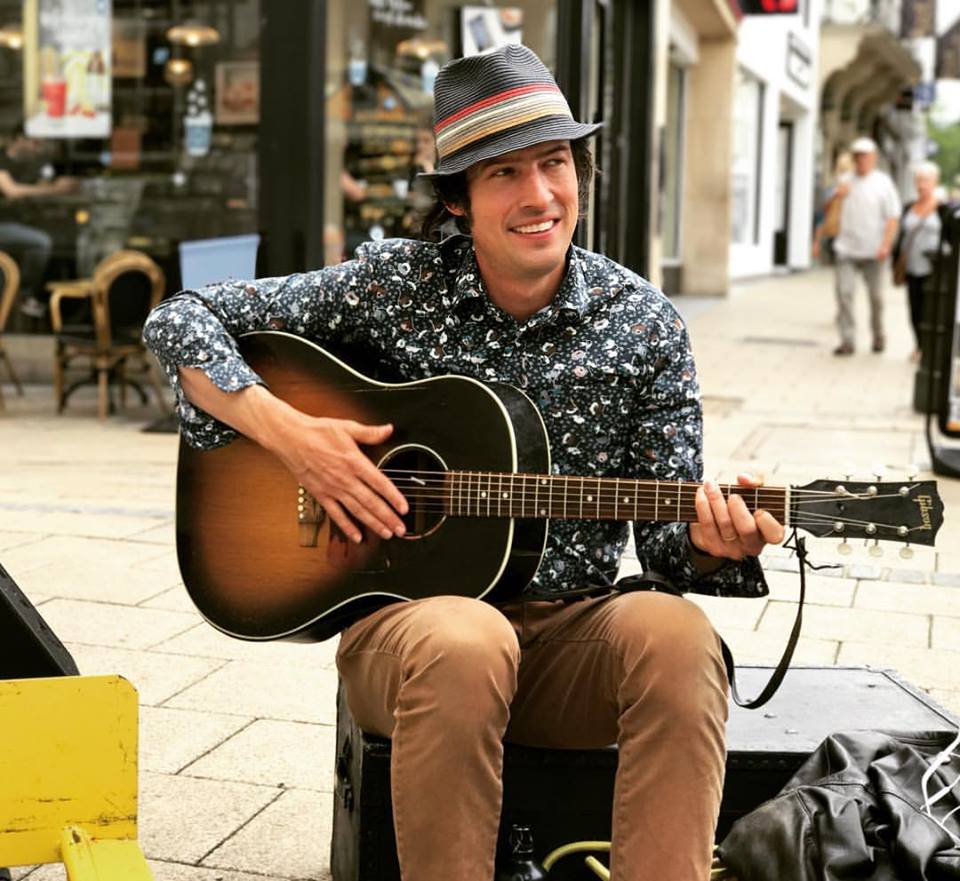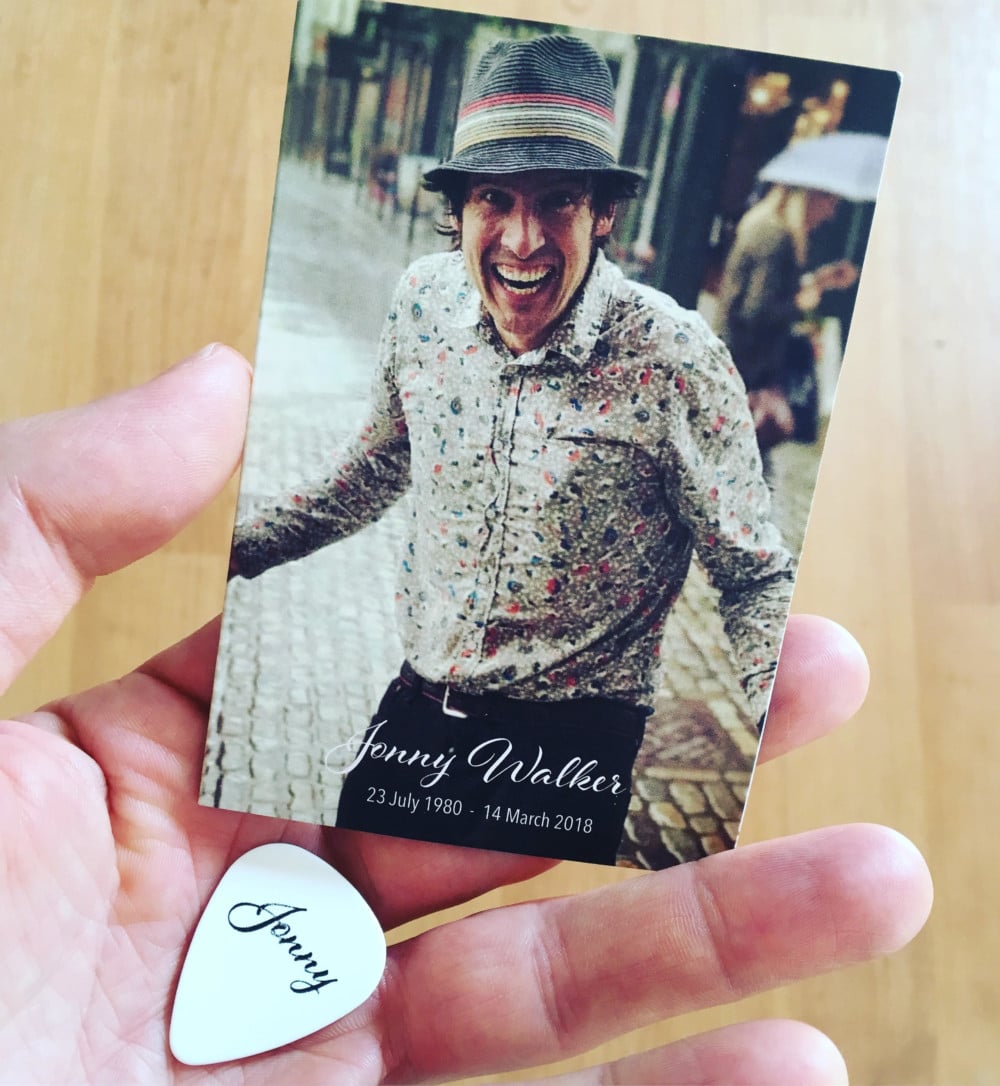
I was sitting at the back of the church with the Musicians’ Union Northern office staff and regional committee colleagues feeling like the naughty kids at the back of the bus. But on this day, the day of our friend Jonny Walker’s funeral, I suspect everyone in that building had at some point been a naughty kid at the back of the bus; that’s the kind of people Jonny attracted – misfits, activists, arguers. The reason we were sitting so far away was not by design, but simply because the place was so full. I’ve never seen a church that packed. The queue to get in was like the line outside a rock concert. We all remarked it was a fitting tribute to a much loved performer.
But it’s not as simple as that. When rock stars die young one talks of cementing the integrity of their legacy, of how the trials of continued existence will not threaten to compromise their creative output, that they can safely pass into legend without everyday normality clinging too long at their ankles. But when a friend dies young we are robbed of countless potential moments, of all those opportunities to shift position, to influence and be influenced, to share and be changed, to affect and be affected. Jonny was not a rock star, he believed too much in the power of groups and cooperation to allow himself to be so set apart from his fellows. His likeness should not be rendered in bronze nor printed as postage stamps, those things are for the dead, Jonny was too much alive.
And surely such honours are meaningless in relation to someone like Jonny – how does one paint the state portrait of a whirlwind? He was the nation’s favourite busker, local papers all round the country reported his death and claimed him as their own. If we put a blue plaque everywhere his work was celebrated we might as well pave the streets of Britain with them.
 But as tribute followed tribute and anecdote followed anecdote my emotions began to shift from sadness to anger. Why do we wait until someone is gone before we allow ourselves to express how much we value them? It happens all the time, it’s practically a national tradition. Is it because we must wait until the whole span of a life is played out before weighing up how much they mattered, like counting up what’s left in their bank account? Is it so difficult for us to make a premature calculation and say to their face: “You are loved, you have value, your impact is immeasurable.” Are we worried about the risk of possibly boosting someone up too much with compliments and affection that we’d rather allow them to sink out of sight completely? What is wrong with us in Britain? How did we get so shrivveled up?
But as tribute followed tribute and anecdote followed anecdote my emotions began to shift from sadness to anger. Why do we wait until someone is gone before we allow ourselves to express how much we value them? It happens all the time, it’s practically a national tradition. Is it because we must wait until the whole span of a life is played out before weighing up how much they mattered, like counting up what’s left in their bank account? Is it so difficult for us to make a premature calculation and say to their face: “You are loved, you have value, your impact is immeasurable.” Are we worried about the risk of possibly boosting someone up too much with compliments and affection that we’d rather allow them to sink out of sight completely? What is wrong with us in Britain? How did we get so shrivveled up?
It’s hard saying this stuff to people, it always feels like there will be another opportunity, especially when the person in question is so young. And besides, I see blogs and memes and twee little social media posts popping up every day telling me to give hugs and smiles and “pay it forward” and yeah yeah yeah, I get it, all you need is love, whatever. I agree, just don’t talk about it all the time, today is not that day, man give me a break, jeez.
I freely admit I am not good at performing my emotions. The very fact that I use the word “performing” in such a context demonstrates the slightly frosty and suspicious relationship I have with them. I’m not spontaneous with my feelings, they ball themselves up like rejected manuscripts dotted around the waste paper basket of my head and heart. I don’t cry much, I don’t tell people I love them, I’m not free with hugs. Then every now and then there will be a bizarre trigger and out it all comes. I don’t cry at weddings or funerals but I cried during the scene in Saving Mr Banks when they sing “Let’s Go Fly A Kite”. Not a little bit either, I sobbed until I was faint, my whole shirt was sodden and I turned pale green from moisture loss. I am a British man who has no idea what to do with emotions because this country has always mangled up the feelings of its people, explaining it away with nonsense phrases like “stiff upper lip”. And so we grow to distrust the sentiments of those who are more free with their feelings and look askance at people making the effort to inject a bit of lightness into life, or we parcel it up and confine it to music festivals where people can act a bit mad for a weekend then go back to their call centres on Monday morning to talk about PPI.
Jonny was always trying to change the world around him, to make it better. Whether it was through the Keep Streets Live campaign or his work with homeless people, or just in tirelessly sparking debate with anyone in possession of a contrary opinion. And he didn’t know how much people admired/loved him for it. Or if he did know it, he didn’t know it ENOUGH. And this blog will join the countless others that suggest we should probably all do more on a day to day basis to make people feel valuable, more successful as human beings, because you never know what’s round the corner. But it’s hard, it feels weird. On the day of the funeral I felt all stirred up to tell my friends what they mean to me but that feeling is already starting to get eroded by my chronic Britishness. This morning I started writing emails to old friends, trying to put this stuff into words. I didn’t get very far, anyone who reads the drafts would probably think I’m experiencing a breakdown or a religious intervention. And then I imagine how awkward I’m possibly making the subjects feel with this sudden outburst and I worry they’ll feel a sense of duty to respond in kind and how dare I put them in that weird position and who do I think I am to talk about this stuff anyway? See, Britishness. I’m riddled with it. It’s lethal.
I can’t believe Jonny is dead. Such an energetic, driven, honest and passionate person. How can such a presence no longer be present? The world is getting darker all the time, suspicions and rivalries and hatred are massing more and more, loneliness is rife, depression is rife but there is so much noise we don’t always notice. It is so important to support our friends, to know when they are vulnerable and for them to know when we are vulnerable, to peer through all the distractions and diversions to see when people need our help or even just our conversation. Jonny’s music brought people together. Music is really good at doing that. But what do we do when we’re together? That’s up to us.
R.I.P. Jonny Walker 1980-2018


